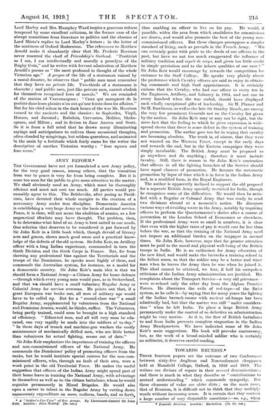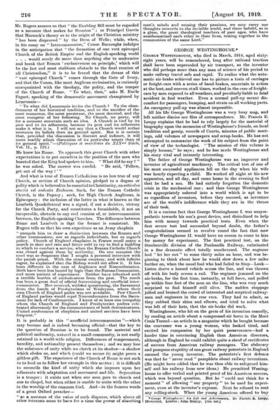TOWARDS REUNION.*
THESE fourteen papers are the outcome of two Conferences between sixty-five Anglican and Nonconformist clergymen held at Mansfield College, Oxford, in 1918 and 1919. The writers are divines of repute in their several denominations ; and there is much in what they describe as " contributions to mutual understanding" which commands sympathy. But these elements of value are obiter dicta ; on the main i813110, that of Reunion, it is difficult not to think that they multiply words without increasing sense. It is certain that they contain a large number of very disputable assertions :—as, e.g., when
• Towards Reunion. London : ilacmWan. 17s. 6d. net.]
Mr. Rogers assures us that " the Enabling Bill must be regarded as a measure that makes for Reunion " ; or Principal Garvie that Harnack's theory as to the origin of the Christian ministry " has been disproved " by the Dean of Wells ; while, when, in his essay on " Interconummion," Canon Burroughs indulges in the anticipation that " the formation of one vast episcopal Church of the British Empire and the English-speaking world . . . would surely do more than anything else to undermine and break that Roman ' exclusiveness on principle,' which will be the last and most stubborn obstacle to the final reunion of all Christendom," it is to be feared that the dream of this " vast episcopal Church " comes through the Gate of Ivory, and that the Canon, like most Anglican ecclesiastics, is curiously unacquainted with the theology, the polity, and the temper of the Church of Rome. " To what, then," asks M. Emile Faguet, speaking of the democratic movement championed by
Lamennais- `• To what did Lamennais invite the Church ? To the aban- donment of her historical tradition, and to the sacrifice of the most numerous, the most persistent, the most devoted, and the most energetic of her following. No Church, no party, will for a moment entertain, such an idea. A Church is tied by its past and to its adherents, because its past and its adherents make it what it is. I will not say that a Church would rather renounce its beliefs than its general spirit. But it is certain that, provided the 'discussion is discreet and indirect, it will more readily admit discussion of its particular tenets than of its general spirit."—(Politiquag et mordietee du XIXtne Slade, Vol. II., p. 123.)
He knew his Rome. To approach this great Church with other expectations is to put ourselves in the position of the man who boasted that the King had spoken to him. " What did he say ? " he was asked. The answer was candid. " He said, 'Fellow, get out of the way 1 ' "
And what is true of Roman Catholicism is no less true of any Church, or section of Church opinion, pledged to a dogma or polity which is believed to be essential to Christianity, an articulus stantis set cadentis Ecclesiae. Such, for the Roman Catholic Church, is the Papacy ; such, for High Church Anglicans, is Episcopacy : the inclusion of the latter in what is known as the Lambeth Quadrilateral was a signal, if not a decisive, victory for the Church Party, and constitutes a formidable, if not an insuperable, obstacle to any real reunion of, or intercommunion between, the English-speaking Churches. The difference between Rome and Lambeth is that the former is consistent. Mr. Rogers tells us that his own experience as an Army chaplain " compels him to draw a distinction between the Roman and other communions, not as regards individuals, but as regards policy. Church of England chaplains in France recall many a search in sleet and rain and bitter cold to try to find a building in which to conduct a service, when the Roman Catholic Church was closed against them by authority. On one occasion the need was so desperate that I sought a personal interview with the parish priest. With the utmost courtesy, and with infinite regret, he explained that the Bishop would not allow it. It has been different in the case of Anglicans and Nonconformists. Both have been less bound by logic than the Roman Communion, and more patient of experiment. Neither have inherited such a terrible burden of exclusiveness from the past. The result has been a great deal of official fraternising and unofficial inter- communion. Men received, without questioning, the Sacrament from the hands of Presbyterians or Wesleyan, where their own Church of England padre was not available. Few Church of England padres would repel Nonconformists from the Sacra- ment for lack of Confirmation. I know of at least one troopship where the Church of England and Presbyterian padres cele- brated alternately for the communicants of both denominations. United conferences of chaplains and united services have been frequent."
It is probably in this " unofficial intercommunion "—which may become and is indeed becoming official—that the key to the question of Reunion is to be found. The material and political uniformity, natural in a small community, is not easily retained in a world-wide religion. Differences of temperament, heredity, and nationality present themselves ; and we may lose the substance of unity while we clutch at its shadow—a shadow which eludes us, and which (could we secure it) might prove a giftless gift. The experience of the Church of Rome is not such as to lead us to follow her example in this matter : it is difficult to reconcile the kind of unity which she imposes upon her adherents with adaptation and movement and life. Separatism is a temper it exists not when one man goes to church and one to chapel, but when either is unable to unite with the other in the worship of the common Cod. And—in the famous words of a great Oxford preacher- " as a measure of the value of such disputes, which above all other interests seem to have for a time the power of absorbing
men's minds and rousing their passions, we may carry our thoughts onwards to the invisible world, and there behold, as in a glass, the great theological teachers, of past ages, who have anathematized each other in their lives, resting together in the communion of the same Lord."



































 Previous page
Previous page